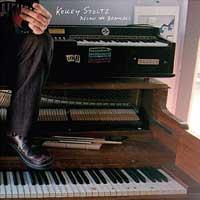Kelley Stoltz is a man that's not afraid to make known his influences. I wouldn't go so far as to say he's riding anyone's coattails, but song after song makes it more than apparent that bands like Pink Floyd and songwriters like John Lennon are such.
Using his piano as a driving force, such instruments as bass, guitar, clarinet, and harmonium all find their way into the fold at one point or another, with a little help from a small but strong supporting cast of musicians. Regardless, however, of any instrumental twist Stoltz throws out, it's his voice that's most prevalent in the music, and it's his voice that needs to make an impact.
The problem is that I don't find his voice to be all that engaging. It's not off-key, it's not crackly, but it just doesn't grab me. That's not to say I can't derive some enjoyment, however, as there are some endearing qualities on the record that regardless of my opinions, I can appreciate. The whimsical "Prank Calls" gives Stoltz's voice a very âold-timey' garage rock feel, and even the piano keystrokes evoke thoughts of an old time speakeasy. The retro feel of that song is not indicative of the entire record, however, as tracks like "Words" offer a much lighter, a much more mellow feel. Stoltz tries to let his voice take a bit more command here, as the piano merely serves as a background for the soulful crooning. Still though, I can't shake the feeling of wishing his voice had a bit more of an actual pull, rather than just being âgood.'
Many people may not share my sentiments, as this isn't a very serious album. I'm not saying it's a joke -- far from it, but the lighthearted musings and playfully painted feelings are nothing wrenching, and nothing overly serious or thought provoking. That's for another songwriter, another time and place. One look at the lyrics for "Memory Collector" will cement that realization;
It's your being in the simplest song, it's the melody so strong / It won't let you forget what it is you've done, between the brain and the blackboard every lesson / Right or wrong you know that you're still guessing / And that shine hasn't been replaced it'll hide the lines on your face.Silly and nonsensical, the lyrics require no more thought from a listener than the most basic of song structures and instrumentation. Taking numerous cues from a simpler time in music -- the `60s, Stoltz establishes a stong, albeit not completely memorable basis, on which to build his playful songs and style.
